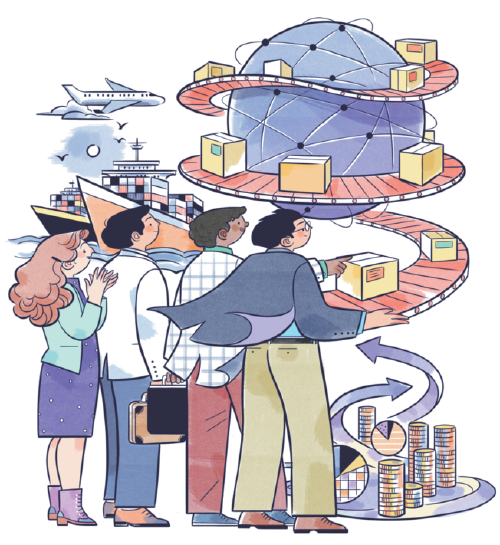Entrepreneurship driving world economy

LI MIN/CHINA DAILY
The global economy faces a new turning point amid a polycrisis. Over the past three years, the COVID-19 pandemic and geopolitical conflicts have overshadowed economic growth. The World Economic Forum's Global Risks Report 2023 revealed that these conflicts and geo-economic tensions have sparked a series of interconnected global risks, including energy and food supply shortages, cost of living crises and debt servicing challenges, and these are likely to persist for the next two years. While tensions between China and the US show promising signs of easing, uncertainty remains.
Nevertheless, at a time when the world economy is facing major challenges, several key economic indicators are showing positive upward trends. Major economies remain resilient and emerging economies have managed to steer clear of financial distress. In Europe, the burden of high gas prices seems to have eased, which could lead to higher incomes, higher consumption and lower inflation. China's economy stabilized and rebounded to a good start. It reported 4.5 percent year-on-year growth for the first quarter, which is higher than expected.
Where is the world heading? At this pivotal moment for a global economic recovery, the World Economic Forum's Annual Meeting of the New Champions returns as a physical event after three years, and will be held in Tianjin, China, from June 27-29. More than 1,500 global leaders and innovators from business, government, academia, civil society, and international organizations will gather and engage in dialogues on how to reinvigorate innovation in Asia and worldwide. Guided by entrepreneurship, they will explore ways to revitalize the global economy, establish new industry models and partnerships, and steer the global economy toward a more equitable, sustainable and resilient future.
Although the process will be challenging, if we work together for a shared future, 2023 will be a year of economic recovery. Stability, transparency, sustainability and policy predictability are crucial for rebuilding the confidence of entrepreneurs, who are the creators of social wealth and the drivers of innovation. In the meantime, green industries and innovative technologies are essential for promoting a just transition and achieving long-term sustainable growth.
As the world's second-largest economy and a major trading partner for over 140 countries and regions, China holds the largest share of the global trade in goods, which shows its importance within the international economic system. 2023 is expected to see a rebound in China's economy, with the IMF forecasting a 5.2 percent GDP growth, boosting both the regional and world economy. Despite facing long-term challenges such as potential productivity growth stagnation and demographic shifts, China is well-equipped to transform these challenges into opportunities by developing green and innovative industries and fostering inclusive and sustainable growth.
China aims to peak its carbon emissions by 2030 and realize carbon neutrality by 2060, which presents unprecedented difficulties and demands tremendous efforts. Globally, factors such as geopolitical conflicts, energy crises and industrial decoupling increasingly hinder climate action. In this context, international cooperation becomes particularly crucial.
Addressing climate change requires that we mobilize global resources for cross-border, cross-sector and cross-industry cooperation. We are pleased to see that many Chinese companies have already recognized the Forum's unique value and are actively partnering with the Forum on initiatives to drive climate change action.
As countries recover and prices stabilize, pent-up consumer demand is being unleashed. The pandemic accelerated shifts in consumption habits, significantly impacting all sectors and shaping the future business and consumption landscape. The retail and service sectors that were most affected by the pandemic must prepare for a consumer boom while adapting to changing consumer habits.
Since 2018, the Forum has selected 150 lighthouse factories in global advanced manufacturing, with China home to 50 of them. These companies integrate advanced technologies into strategic planning, production processes, customer management, supply chains and after-sales services. Meanwhile, emerging technologies, such as artificial intelligence, quantum computing and bioengineering, present infinite opportunities as well as new considerations.
According to the Forum's Chief Economist Outlook 2023, successfully navigating the unpredictable path ahead requires countries to cooperate and adapt to a changing environment. Achieving these goals entails establishing and strengthening public-private and East-West dialogues, promoting stakeholder participation, moving entrepreneurship from idea to reality and effecting positive change on a broader scale.
In January, China's then Vice-Premier Liu He emphasized at the Forum's Annual Meeting in Davos that openness drives reform, development and China's economic progress, and that China's doors will continue to open wider. The Forum will continue to work to build bridges between the East and the West, deepen understanding, accelerate cooperation, strengthen dialogue and mitigate conflicts. We hope that more Chinese companies will join the process and contribute to a better world.
The author is chair of Greater China, World Economic Forum.
Photos
Related Stories
- 2023 Summer Davos opens in N China's Tianjin
- Summer Davos resumes in China after four-year hiatus
- China sends fresh signals for cooperation amid global challenges
- Session themed "Top 10 Emerging Technologies of 2023" for Summer Davos held in Tianjin
- Chinese premier offers insight into how world can navigate tough times
Copyright © 2023 People's Daily Online. All Rights Reserved.









